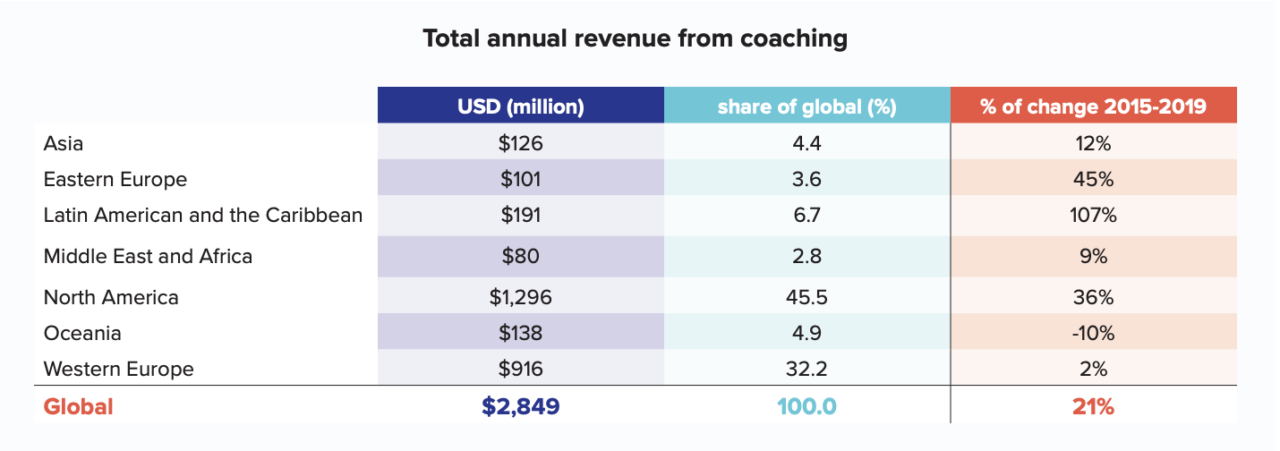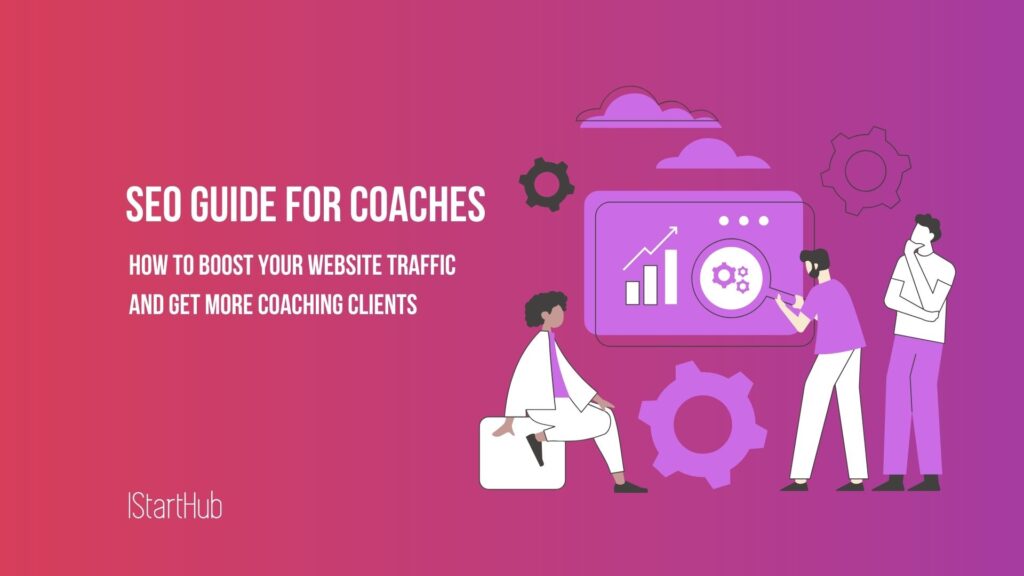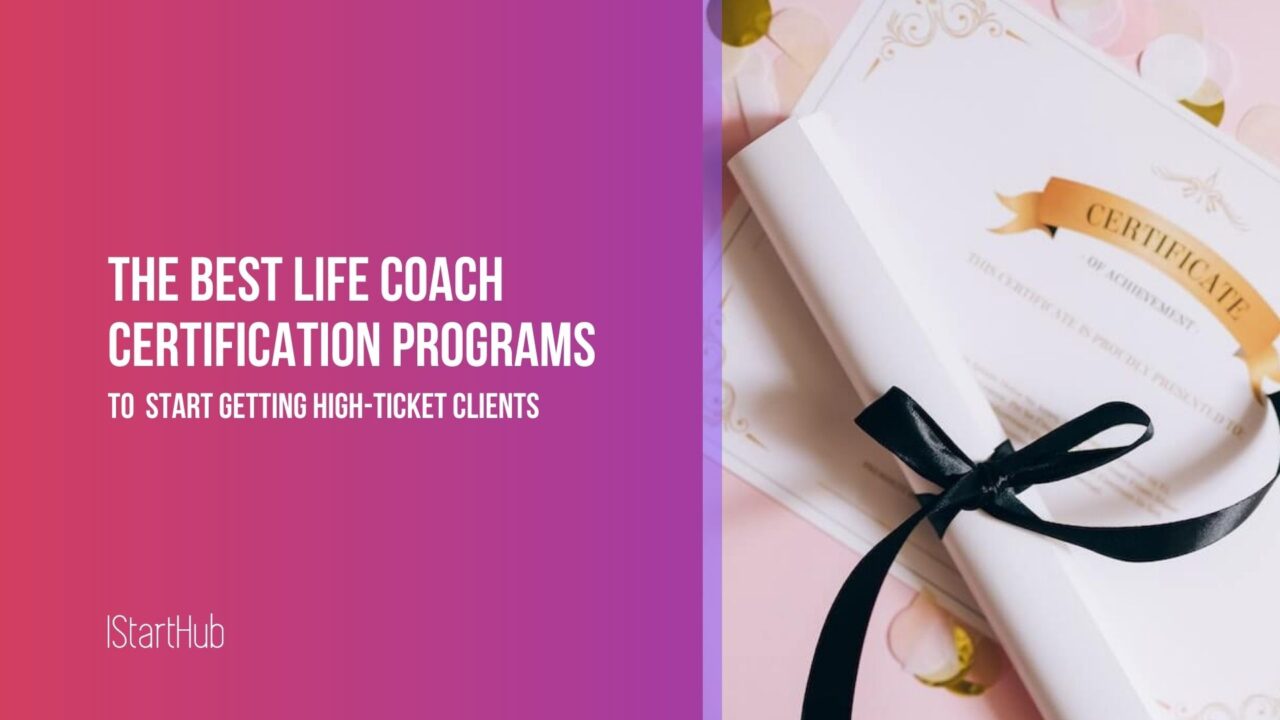Now Reading: How to Become an Executive Coach: Benefits, Services, Certification
- 01
How to Become an Executive Coach: Benefits, Services, Certification
How to Become an Executive Coach: Benefits, Services, Certification

The global growth for executive business coaching is evident as more and more organizations continue to recognize the value of coaching in developing leaders and improving the performance of their workforce.
In fact, a report by the International Coach Federation (ICF) estimated the global total revenue from coaching to be worth $2.849 billion U.S. dollars by 2019, a 21% increase since 2015. Executive coaching accounted for a significant portion of this market.
So, if you’re considering it as a career option, you’re on the right path. In this post, I provide insights into how to become an executive coach and obtain the necessary certification.
What Is Executive Coaching?
Executive coaching definition sounds like a personalized type of coaching that helps individuals and teams achieve personal and professional growth and become the best versions of themselves.
It’s a process that helps entrepreneurs, managers, and business professionals to identify areas that need improvement, so they can gain greater self-awareness, clarity of objectives and goals, and develop a strategy to achieve them.
This could range from improving communication and leadership skills to enhancing decision-making and problem-solving abilities.
But just because it’s termed ‘executive coaching’ doesn’t mean it’s just for executives. It’s for anyone who wants to achieve their full potential in their personal and professional lives.
During the coaching process, the executive coach and client work together to identify areas of weakness and strength and areas of improvement. The coach then empowers the client to develop a strategy to address their goals. The plan may involve developing new skills, adopting new habits, or changing behaviors.
The entire process is professional, confidential, and non-judgemental, meaning the coach provides a safe space for the client to explore their thoughts and feelings and experiment with new approaches to personal and career life.
The coach will guide the client through the process, offering accountability and support and helping them stay on track and make progress toward achieving the set goals.
Overall, executive coaching can be a powerful tool to facilitate a transformative process that can encourage individuals to unlock their full potential and achieve greater success in all aspects of their lives.
What Are the Benefits of an Executive Coach?
If you’re passionate about helping others succeed, a career as an executive coach can be rewarding personally and professionally. Some of the benefits of executive and professional coaching include:
Financial stability
Of course, monetary benefits are a great motivation for any career choice, and executive coaching isn’t any different. According to the ICF Global Coaching Study, conducted in 161 countries and territories, executive coaching is a booming business.

Source: ICF Global Coaching Study 2020
So, how much does an executive coach make? A recent report by Glassdoor shows that the average salary for an executive coach is $158,119 per year. That’s a lucrative income to live a comfortable lifestyle.
Plus, as an executive coach, you can charge premium rates for your services, especially if you work with high-profile clients.
Flexible work schedule
Working as an executive coach allows you to set your schedule and work from anywhere. Whether you want to work from home, a beach in Thailand, or a coffee shop. All you need is the internet and a laptop.
Such flexibility offers the work-life balance many people yearn for, meaning you can spend more time with family and friends and tend to your other interests.
Job satisfaction
Apart from financial success and flexible work schedules, the executive coaching career has high levels of job satisfaction. You’ll positively impact people by enabling them to live a better, more fulfilled life.
This, by itself, can leave you with a great sense of satisfaction and fulfillment, which is rare in most professions.
High demand for executive coaching skills
The demand for coaching services has been growing steadily over the years, meaning there’s a high demand for skilled and competent coaches. It also means you have the opportunity to build a successful coaching business and earn a good income.
Moreover, you get to work with high-level executives and leaders in various industries, which can contribute significantly to personal branding.
Executive Coaching Challenges
While a highly fulfilling career, executive coaches may face challenges, such as:
- Building trust, personal brand, and client base, and establishing credibility
- Balancing the needs of clients with personal and professional goals
- Managing client expectations and delivering results
- Maintaining effective communication, professionalism, and confidentiality
- Dealing with difficult clients
The good news is that these challenges can be overcome by establishing a solid coaching framework, setting boundaries, implementing effective time management, and investing in ongoing professional development.
In addition, you should develop effective marketing and networking strategies, maintain ethical standards, and get certified.
What Does an Executive Coach Do: Executive Coaching Services
So, what is the role of executive coaching?
Executive coaching is a leadership, thought-provoking, and creative training process designed to inspire clients to maximize their personal and professional potential.
As a coach, your role is to offer guidance, support, and feedback to clients aimed at enhancing their reputation and ability to succeed at the highest levels.
Some of the executive coaching services include:
- Helping executives develop and implement strategic plans. That is, working with clients to identify areas of improvement, goals, and objectives, and then helping them create an action plan to achieve those goals.
- Improving clients’ communication skills. Anyone in a leadership position understands the significance of effective communication. An executive coach can help leaders and teams develop the skills to communicate more effectively with clients, colleagues, and stakeholders.
- Develop leadership skills. An executive coach can help clients develop their emotional intelligence, decision-making, and problem-solving skills. They can also teach them how to motivate and inspire others.
- Help executives manage change. Change is a constant in the business world, and managing changes is a critical skill for executives. Executive coaches can help leaders overcome specific challenges and obstacles, as they navigate the ever-changing business environment.
Executive coaches provide personalized coaching plans to cater to their different clientele, who come from different backgrounds and industries. The coaching relationship is collaborative, where both the coach and client work together to achieve the client’s goals.
How to Become an Executive Coach?
Executive coaching is a highly specialized field that requires a unique set of skills and competencies. Here are the key steps you need to get started on your journey to becoming an executive coach:
Step 1. Obtain Relevant Certification
According to the ICF Global Coaching Study 2020,
“nearly all coach practitioners (99%) report they have completed some coach-specific training.”
As you would expect, your clients will only work with you if you’re certified or credentialed.
This means that a certification from a professional coaching organization is mandatory. While most executive coaches have a background in counseling, psychology, or business, enrolling in coaching certification programs will be an added advantage.
Organizations like the International Coach Federation (ICF) and the Institute for Professional Excellence in Coaching (iPEC) will equip you with the necessary techniques and knowledge to excel as an executive coach.
Step 2. Build a Strong Personal Brand
Getting clients is perhaps the most challenging part of executive coaching. That’s why creating a personal brand is essential to becoming a successful and reputable coach.
Your personal brand helps you reflect your expertise, values, and unique selling proposition. One effective way to build your personal brand is to create a coaching website where you share relevant, informative, and educational material on your blog.
You can also build a personal brand by:
- Speaking at industry events
- Developing a strong network of contacts
- Attending industry conferences and events
- Joining professional organizations
- Connecting with other coaches and executives on social media
Step 3. Develop leadership skills
As a coach, you’ll need to possess a range of skills and competencies that will allow you to manage your clients more effectively. These can include:
- Active listening and communication
- Goal-setting and planning
- Emotional intelligence abilities
- Basic knowledge and skills in psychology and human behavior
- Critical thinking and problem-solving skills
- Cultural competence and awareness
Step 4. Gain Coaching Experience
The more experience you gain working with clients, the more people will recognize you as an expert in your field. The higher the recognition, the more the clients and the higher the fees.
A great way to gain experience is volunteering with non-profit organizations and working with startups and small business enterprises.
Step 5. Continue Developing Your Personal Brand
Even as you gain more experience and expand your client base, it’s essential to continue to develop your personal brand to get more exposure. You can do so by creating an online coaching course, writing a book on coaching, and speaking at industry events.
Executive coaching certification: the best options
Executive coaching certification helps you demonstrate your professional expertise in the niche. It gives clients and organizations assurances that you’re a qualified, competent, and experienced expert in the field. The greatest advantage of certification is that it can help establish credibility and professionalism in your work.
An executive coaching certification shows that you’ve been through formal training and have an official credential to showcase your expertise.
There are various certification programs available that provide training, mentorship, and assessment. The programs vary in length and cost, and some may require a certain level of education and experience.
Some of the best certification programs you can explore include:
- International Coaching Federation (ICF) is the world’s largest and most acknowledged professional coaching organization that provides external and objective validation of courses and coaches.
- Center for Credentialing & Education (CCE) is a non-profit organization that offers assessment, credentialing, and business support services.
- Certified Professional Coach (CPC), an ICF-accredited course.
- The Coach Training Alliance (CTA) offers ICF-approved certified coaching programs.
- The Institute for Professional Excellence in Coaching (iPEC).
- Center for Executive Coaching (CEC), which offers Accredited Coach Training Program (ACTP)
When choosing a coaching program, be sure to consider factors like:
- Career goals
- Career path
- Cost
- The reputation of the institution
- The focus of the program.
FAQs
Why is executive coaching important?
Executive coaching is an essential tool that provides business executives, entrepreneurs, and leaders a personalized approach to develop their leadership skills and performance, geared towards achieving their goals. When working with a coach, individuals can gain valuable insights into their strengths and weaknesses, as well as areas of improvement. They can then be in a better position to develop strategies that will drive results as they navigate complex business challenges.
What are the best executive coaching programs?
There are dozens of executive coaching programs available. The best program will depend on factors like your individual goals, needs, and level of experience. In addition, you might consider things like the program’s accreditation and reputation, the methodology, and the level of support and resources offered. Some top executive coaching programs include those offered by the International Coaching Federation (ICF), the Harvard Business School, and the Center for Executive Coaching (CEC).
What are the main types of coaching?
Executive coaching is one type of coaching. Others include leadership coaching, life coaching, career coaching, and performance coaching. Each coaching type focuses on a specific area. For example, executive coaching focuses on developing leadership skills for business executives, while leadership coaching may focus more on developing leadership skills at all levels of an organization.
So, do you want to become an executive coach?
You need a combination of skills, knowledge, certification, and experience to become a successful executive coach. The most important skills you’ll require are active listening, emotional intelligence abilities, and critical thinking skills. The executive coaching field isn’t a walk in the park. However, you’ll find it highly fulfilling as you’ll be changing people’s lives for the better.
Tetiana is a business coach and owner of IStartHub, a business media for ambitious female entrepreneurs and small business owners.
















